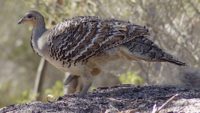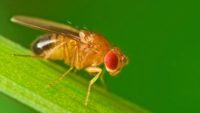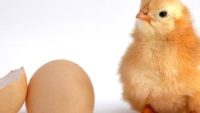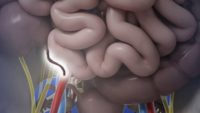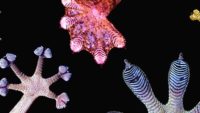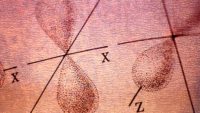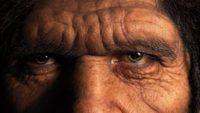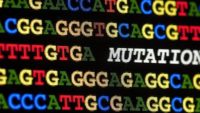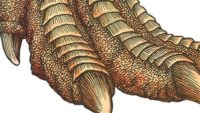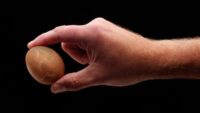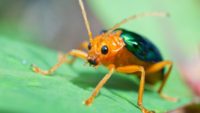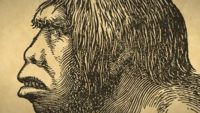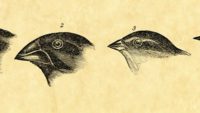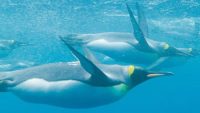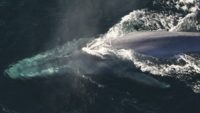By Avery Foley Sexual selection is the process by which the traits that affect mate choice shape the genetics of the species. …read more Source: AIG Daily
In stark contrast to Genesis 1, secular scientists claim that a collision between a planet-sized rocky object and an ancient Earth somehow crafted the moon billions of years ago. This supposed collision was so violent and hot that it would have burned off all the original moon water—assuming there was any. So why do researchers keep finding evidence of water inside the moon? More… …read more Source: icr.org
By Karin Viet If you were an unhatched Malleefowl chick, your life would depend on the ability of your parents to incubate their eggs between 29 to 38 degrees Celsius. …read more Source: AIG Daily
By Ken Ham A recent study of mutations in fruit flies sought to determine how evolution has shaped the humble fruit fly over the past 40 million years and how these mutations will affect fruit flies in the future. Well, we’re all in for a big shock—brace yourselves. According to their research, after 40 million years of future mutations and evolution, fruit flies will become . . . fruit flies! Researchers grew 200 generations of fruit flies and noticed small mutations in their wings that resulted in changes in the width or location of the wing veins. Based on this [More]
By Dr. Elizabeth Mitchell The diversity of bird egg shapes spans a wide range from spherical to elliptical with many degrees of asymmetry. Why? …read more Source: AIG Daily
By John UpChurch The Creator equipped numerous animals, large and small, with astonishing tools to find their way as they migrate around the world. …read more Source: AIG Daily
There are many unsolved mysteries surrounding migratory instincts. …read more Source: creation.com
By Dr. David Menton The light sensitive retina of the eye (which is really part of the brain) contains over 10 million photoreceptor cells. …read more Source: AIG Daily
A dying ammonite leaves behind a permanent impression which tells a story that needs explaining. …read more Source: creation.com
By Dr. David Menton The “human tail” is just one example of what evolutionists call a “vestigial organ.” …read more Source: AIG Daily
By Ken Ham It’s always exciting to see researchers and scientists looking to God’s creation for innovative designs to solve problems. A recent news article highlighted yet another example of biomimicry (copying God’s design): robot grippers for use in outer space, inspired by the design of gecko feet. These new grippers could grab and hold floating objects in microgravity, which is not an easy thing to do since many chemical adhesives don’t work in the various temperatures in space, and suction doesn’t work in a vacuum. Researchers hope these new grippers will eventually help robots move space junk to safer, [More]
By Dr. Andrew A. Snelling Problems remain in the interpretation of the measured Pb isotopic ratios to transform them into ages. …read more Source: AIG Daily
By Dr. Elizabeth Mitchell Amphioxus is an “obvious” link between invertebrates and vertebrates for those who believe they must be linked by a shared evolutionary ancestor. …read more Source: AIG Daily
By Dr. David Menton The survival of living species depends on its ability to pass on its genetic instructions, from generation to generation, without significant alteration. …read more Source: AIG Daily
Researchers shined a laser light on fossil leaves and found some surprising results. What they thought were just impressions of leaves turned out to contain original molecules—persisting after millions of supposed years. More… …read more Source: icr.org
By Dr. Neal Doran The evolutionary “family tree” that ties all dinosaurs together has just been redrawn. What bigger questions does this raise? …read more Source: AIG Daily
By Dr. Nathaniel T. Jeanson In this article, we explore Venema’s claims in Adam and the Genome about genetic sequences that he thinks have lost their function. …read more Source: AIG Daily
By Karin Viet The bombardier beetle’s tail end is equipped with twin “spray nozzles” (or gland openings) to shoot its gaseous ammunition. …read more Source: AIG Daily
Are creation geneticists wrong about mutation rates? And how distantly related should parents be for genetically healthy offspring? …read more Source: creation.com
By Ken Ham Headlines last week boldly proclaimed, “Discovery of 13 Million-Year-Old Ape Skull Shows What Human Ancestors May Have Looked Like.” Of course, this is nothing more than evolutionary hype. What the research team discovered is, by their own admission, nothing more than a baby ape skull. Yet they proclaim, “To find this little baby that perished in volcanic ash 13 million years ago . . . [is] a glimpse of what our prehuman stage looked like.” What the team found was “the most complete skull of an extinct ape species in the fossil record.” Using scans of the [More]
By Dr. David Menton Darwin reasoned that if animals can be selectively bred by man to produce certain traits, then nature can select for limitless traits by natural selection. …read more Source: AIG Daily
Australia’s Lake Eyre does not live up to the age that has been assigned to it. …read more Source: creation.com
By Karin Viet In God’s wise foresight, He equipped the original penguin kind with the genetic information necessary for penguins like the emperor penguin to exist today. …read more Source: AIG Daily
Our ‘backwardly-wired’ retina is an ideal structure to optimize colour vision. …read more Source: creation.com
Tardigrades, also known as water bears, are smaller than a millimeter, live in water, and can endure all kinds of harsh environments. A recent research project found that asteroid impacts and nearby supernovae and gamma-ray bursts would wreck humanity but leave tardigrades unscathed. Does this mean we should expect to find tardigrade-like life on other planets and moons? More… …read more Source: icr.org
When creatures work together to help one other, it defies evolutionary predictions. …read more Source: creation.com
By Troy Lacey A study published in May in the Proceedings of the Royal Society B hypothesized how and when baleen whales grew so large. …read more Source: AIG Daily





















